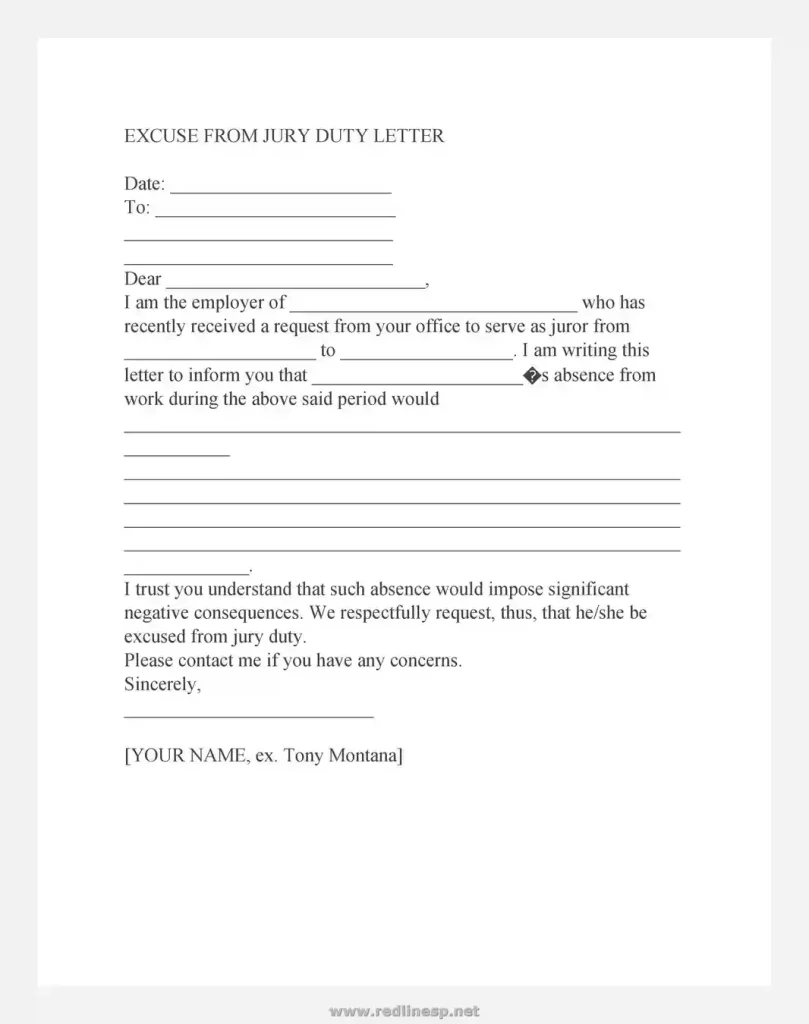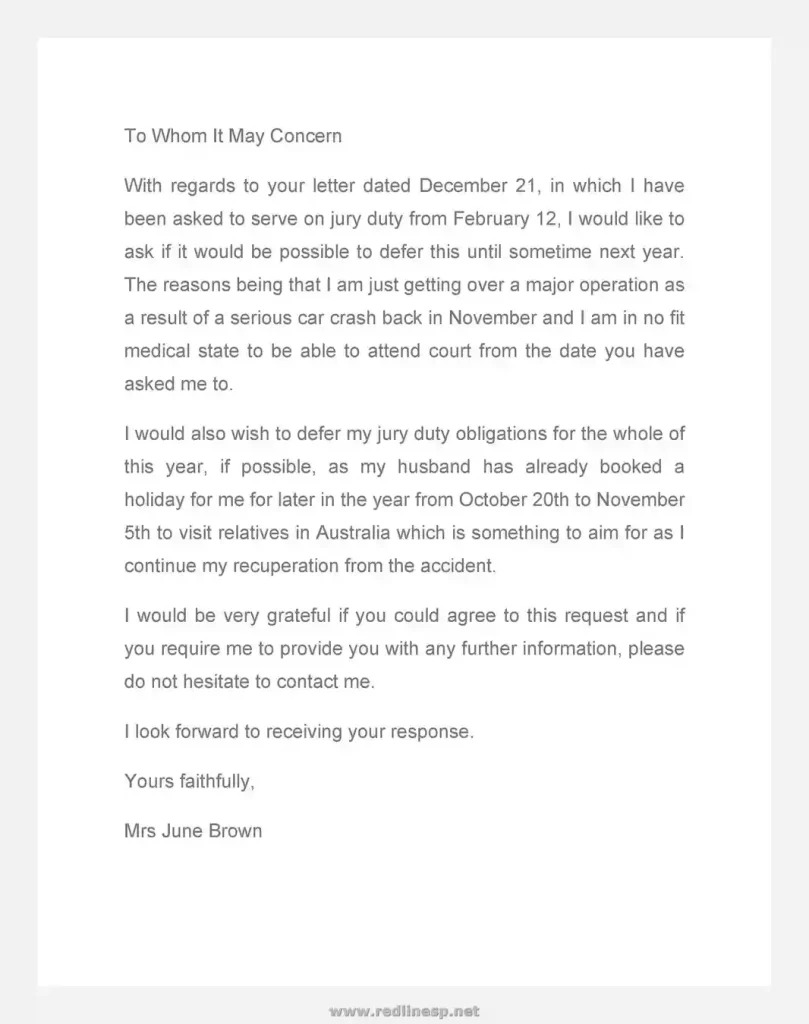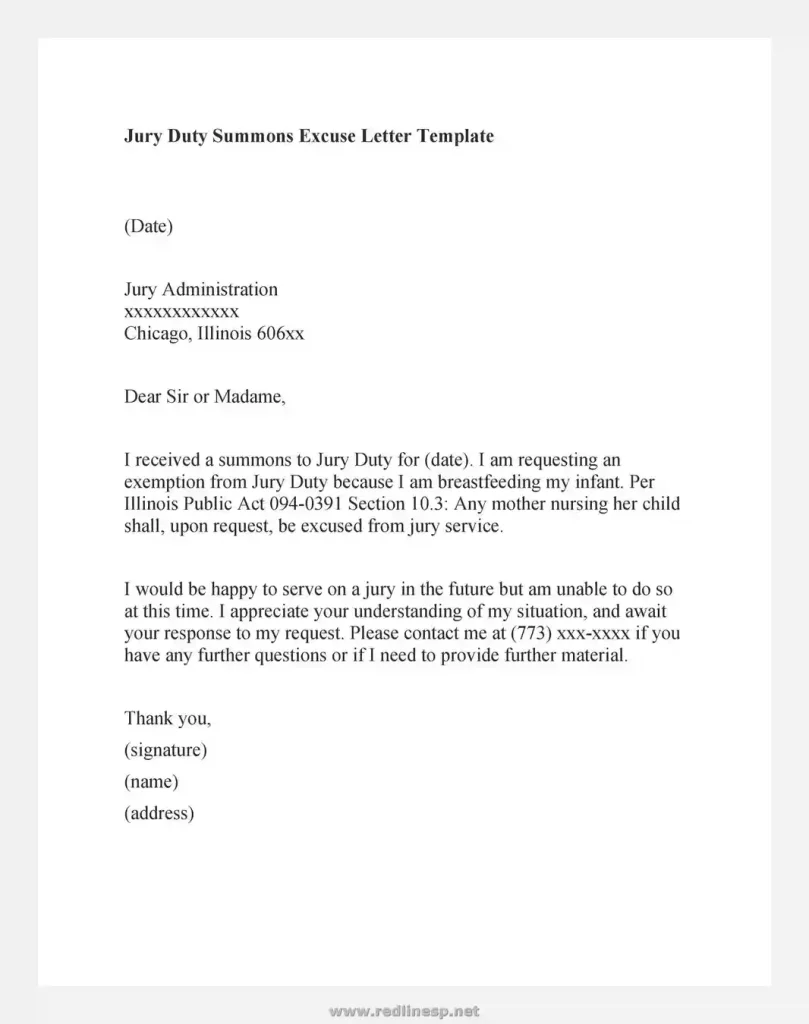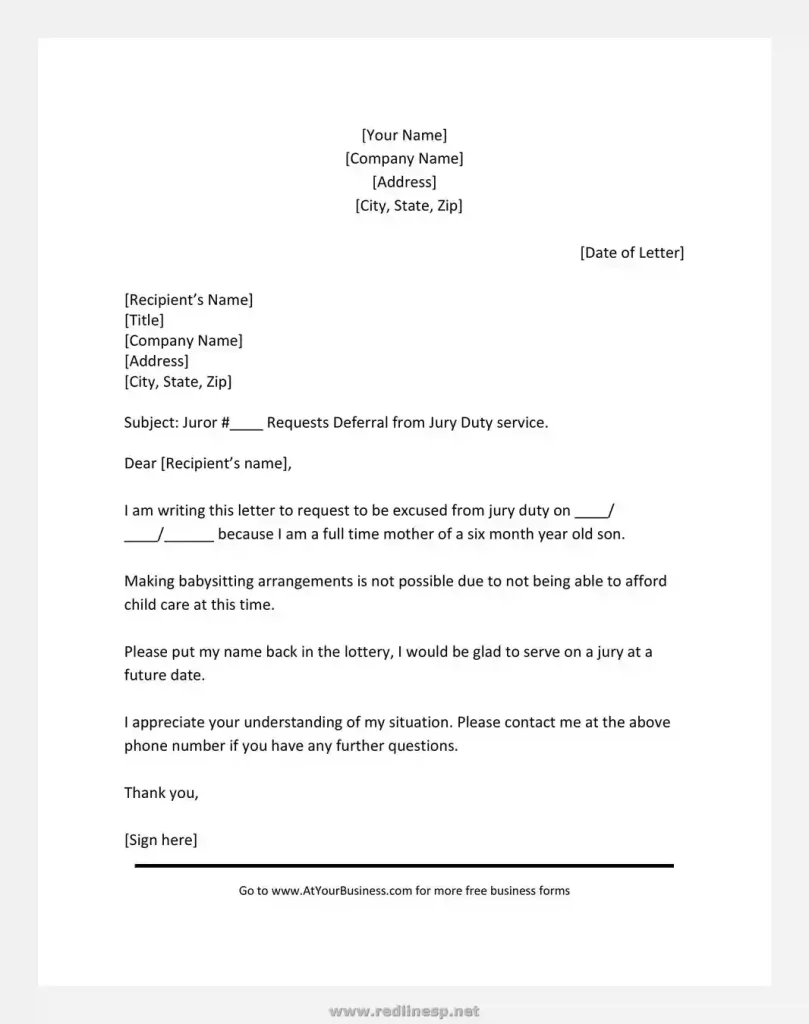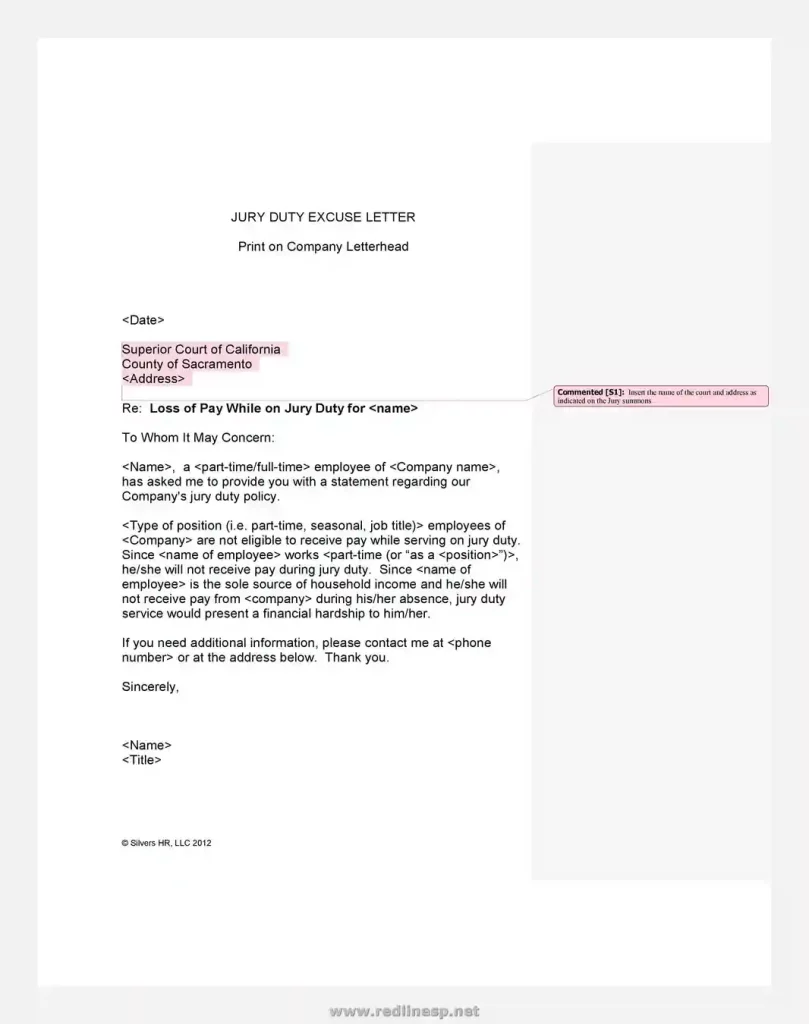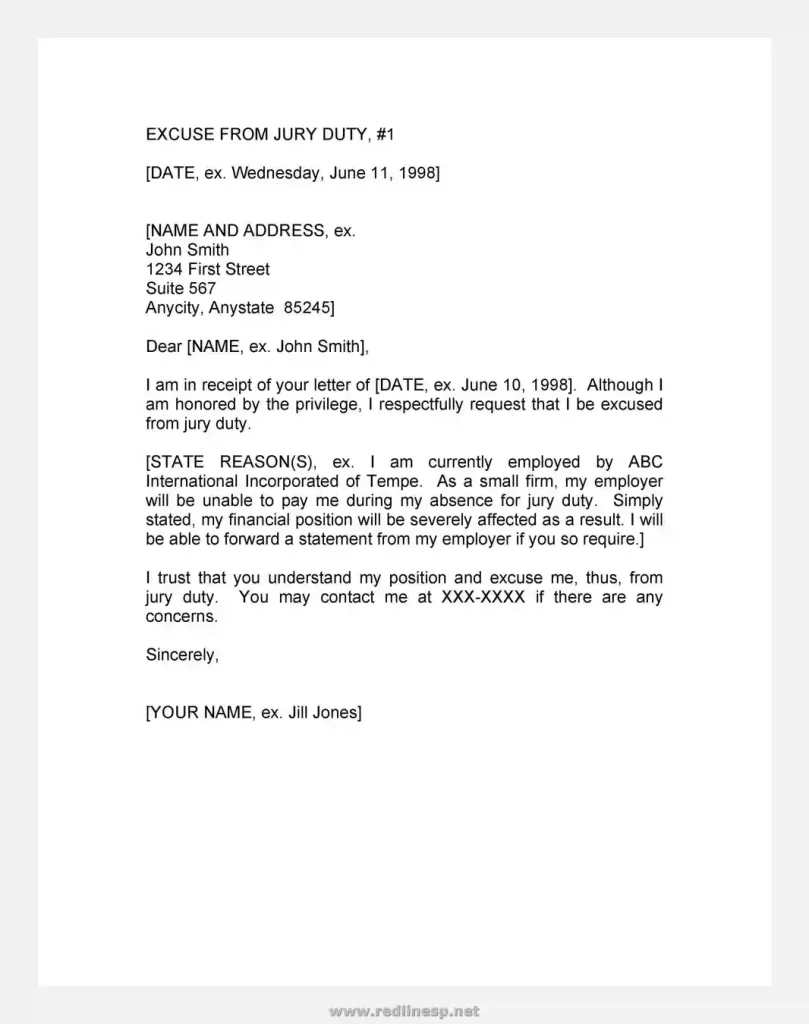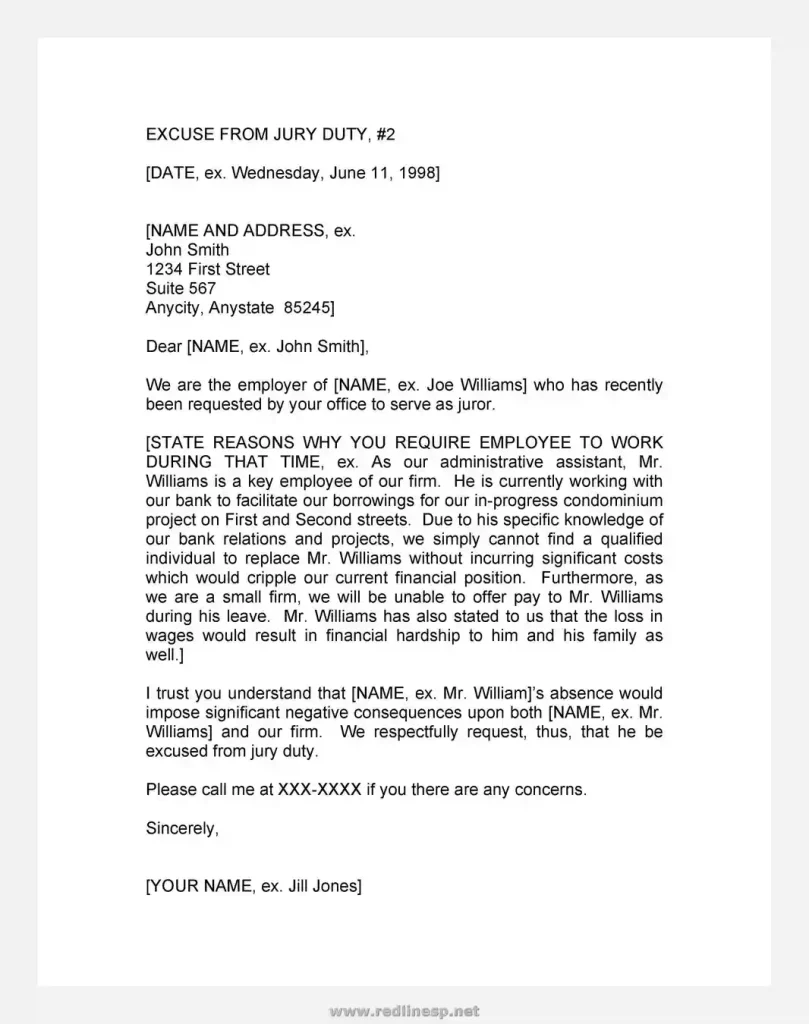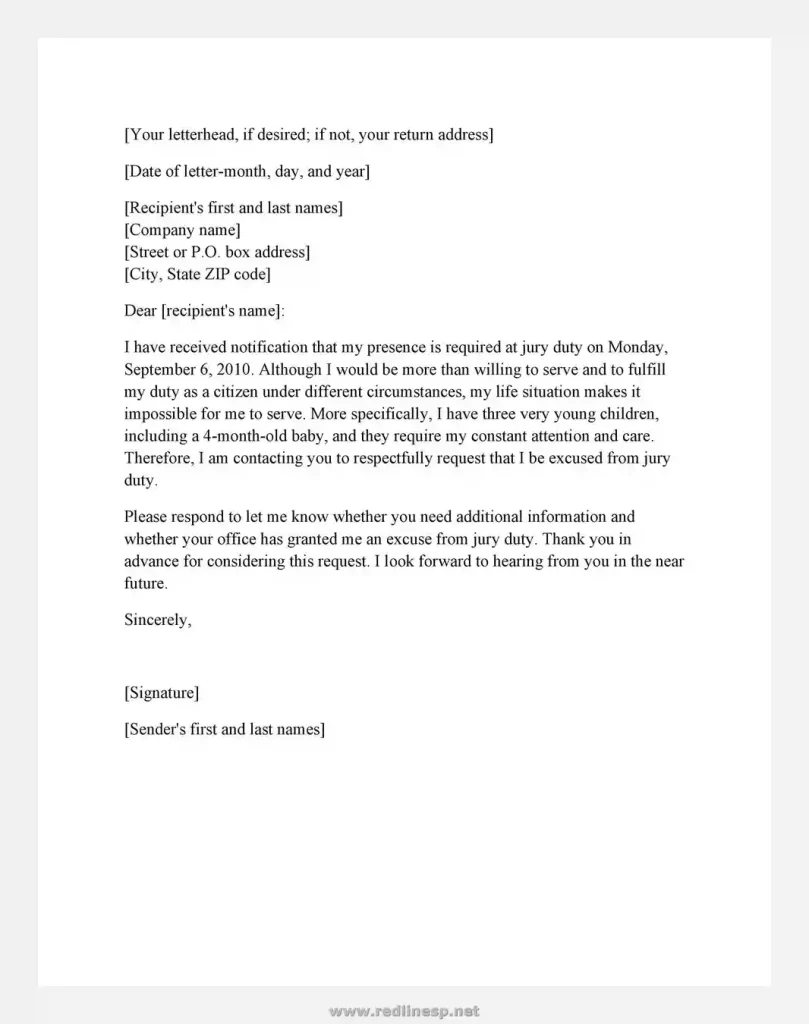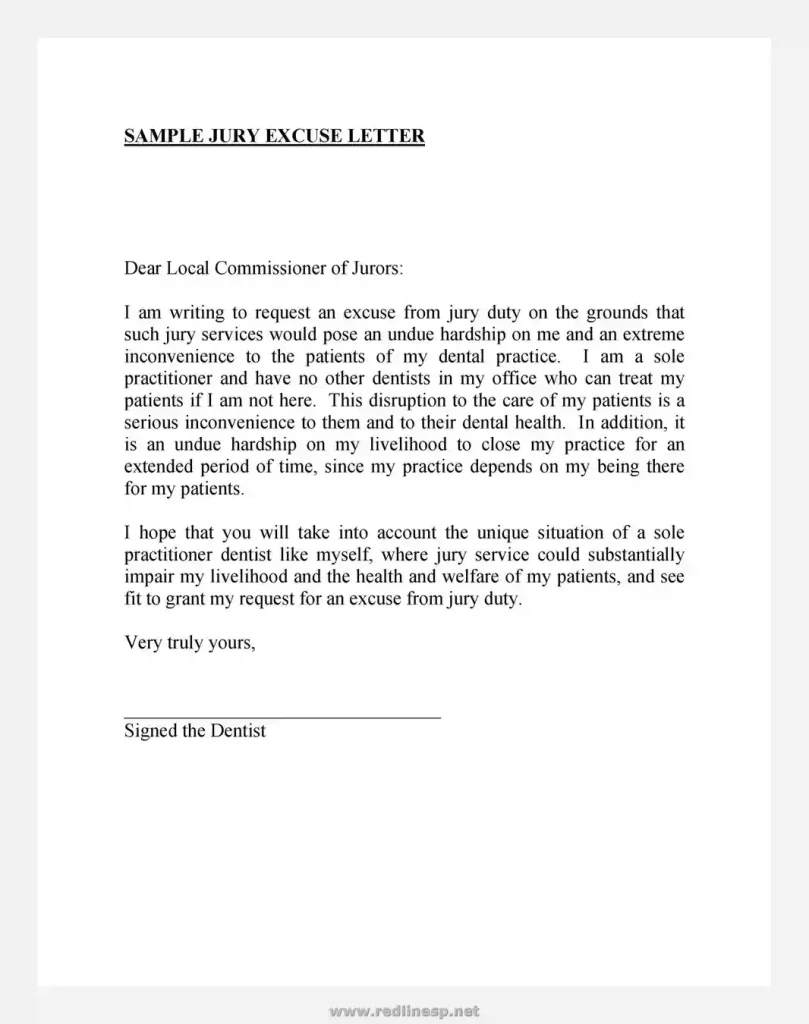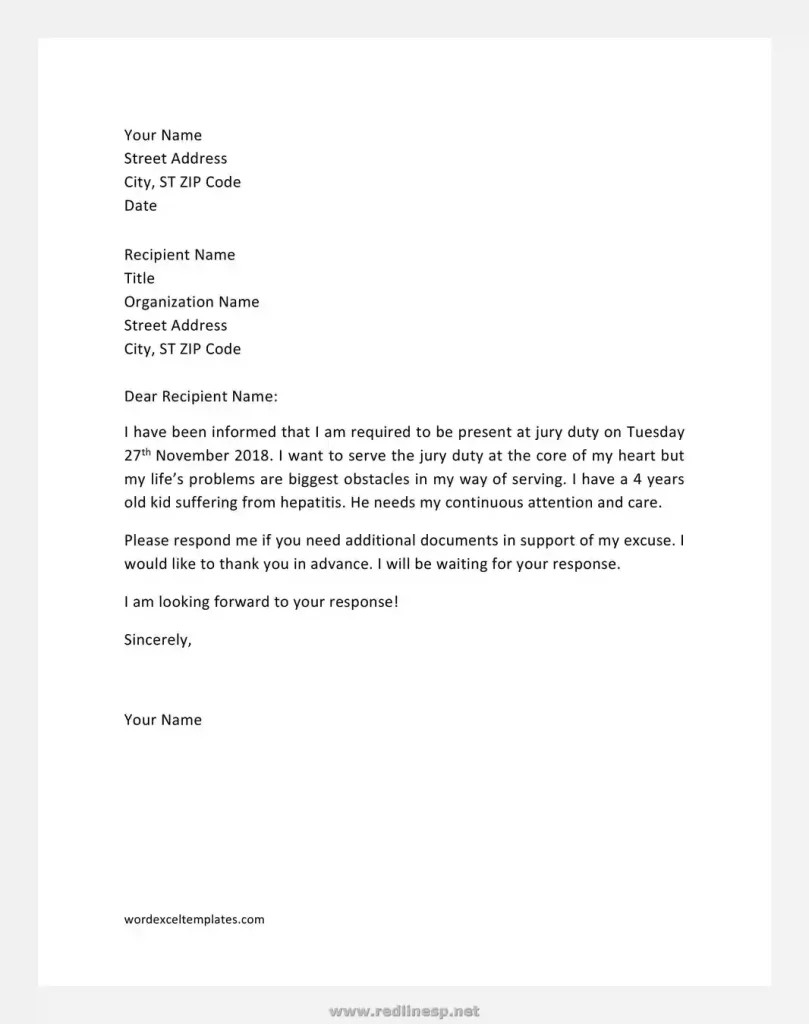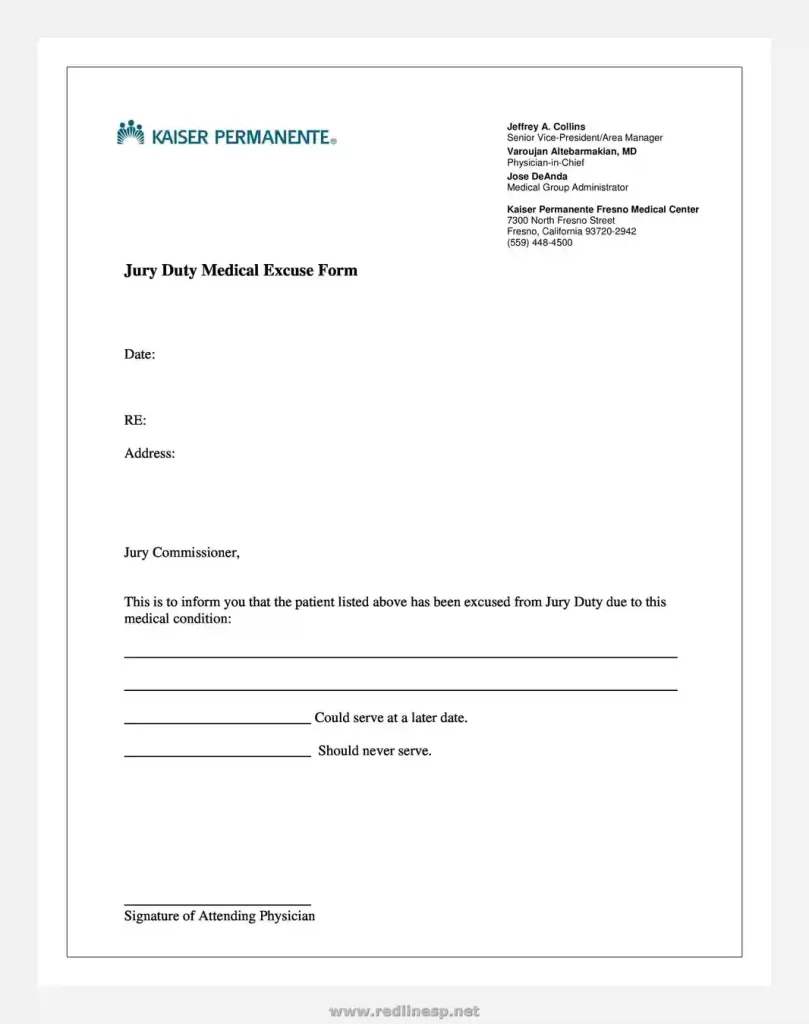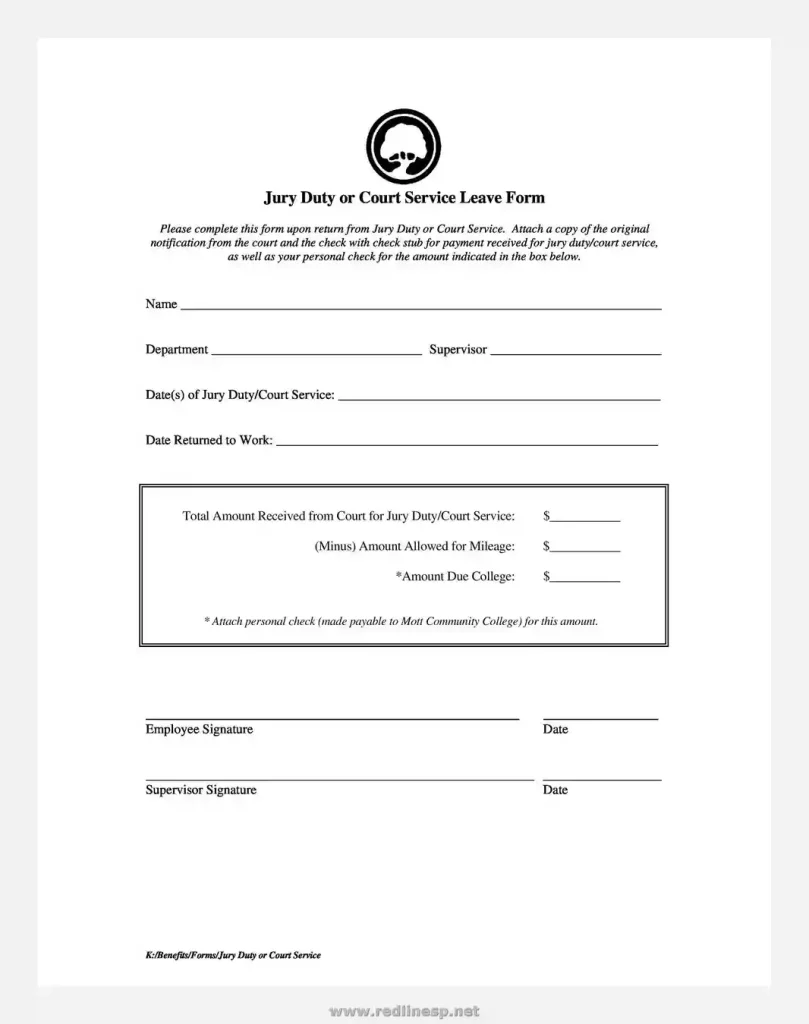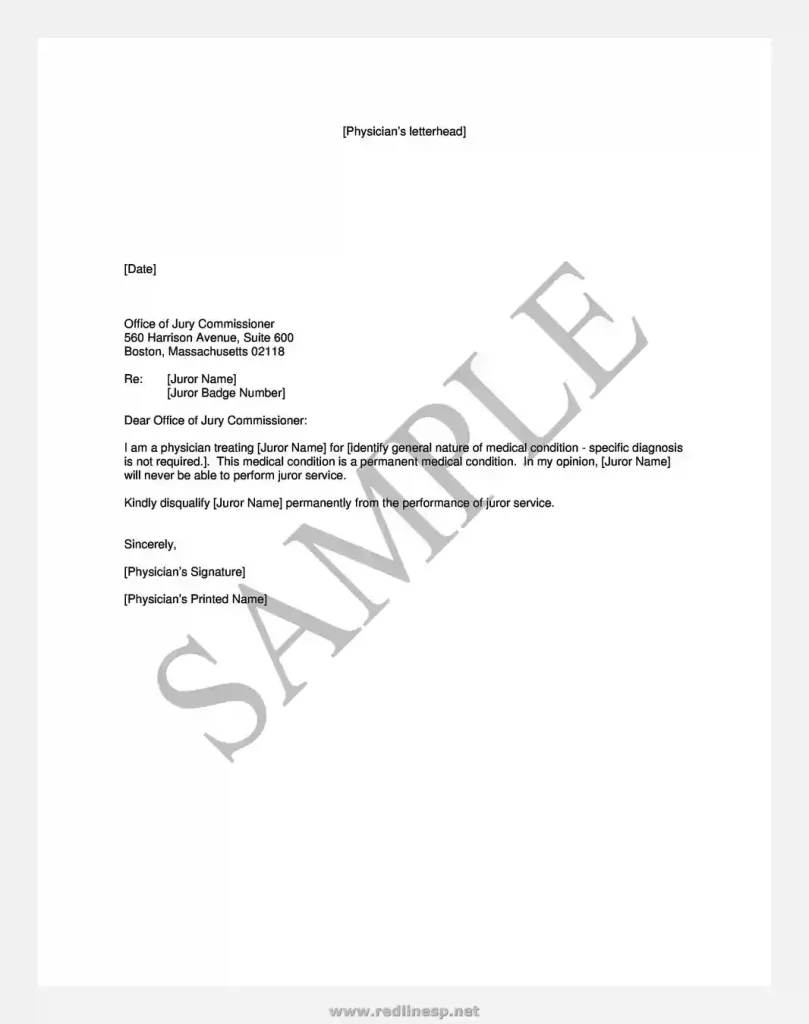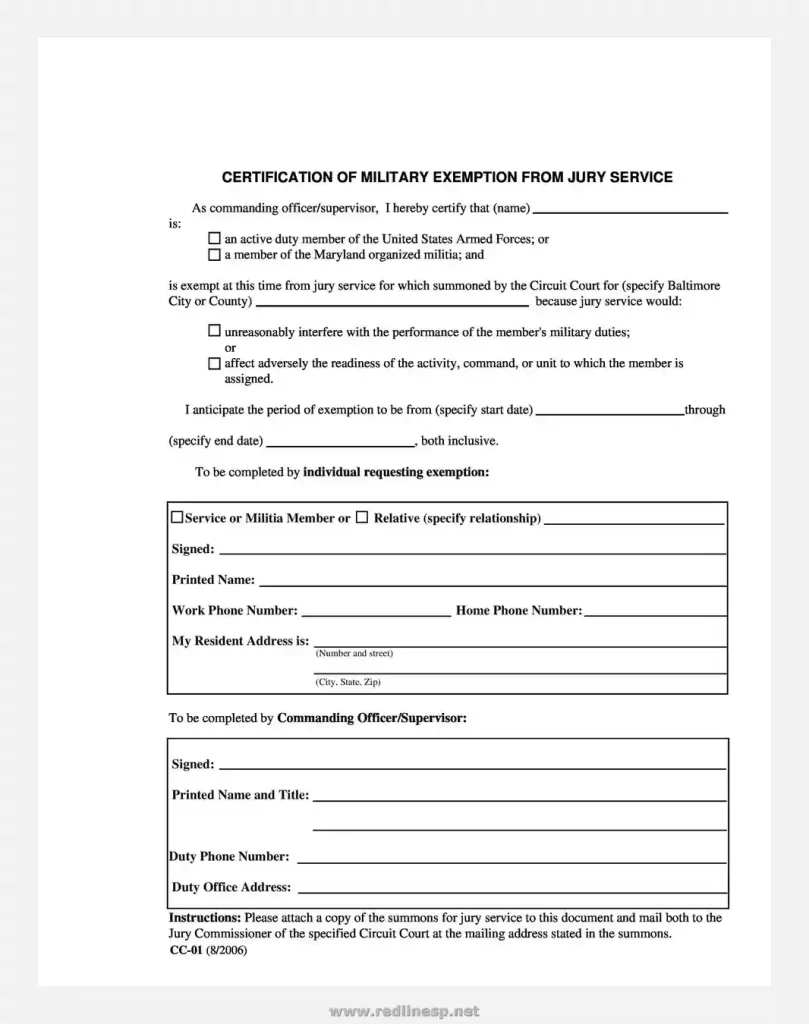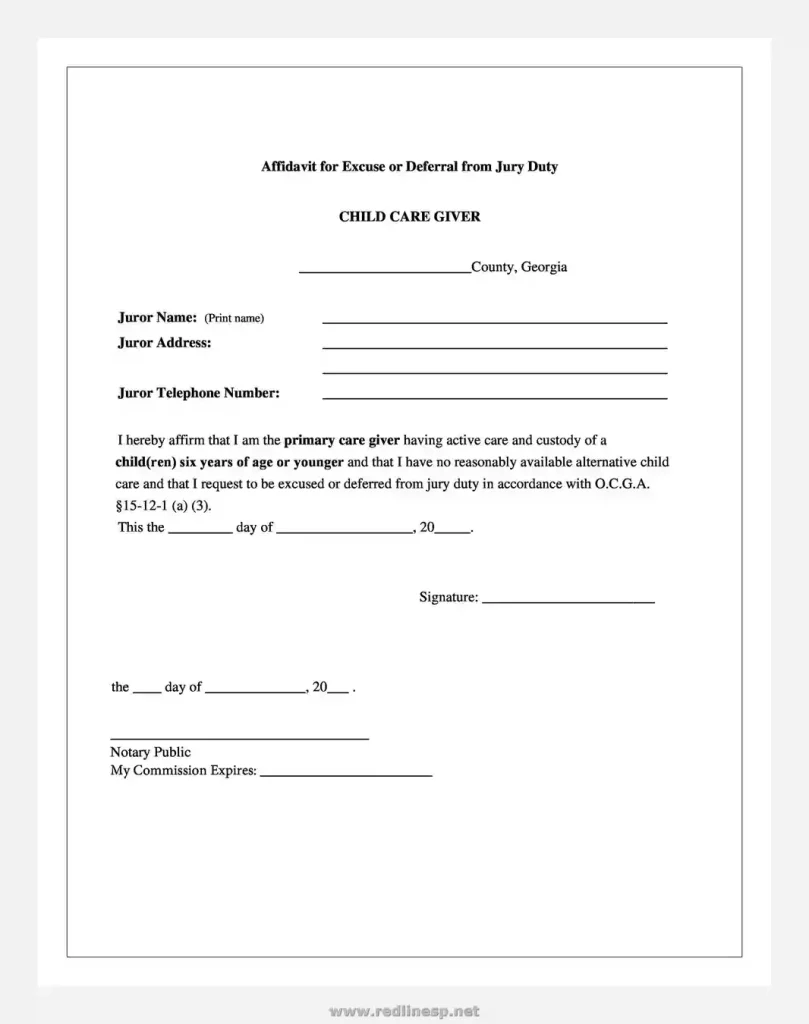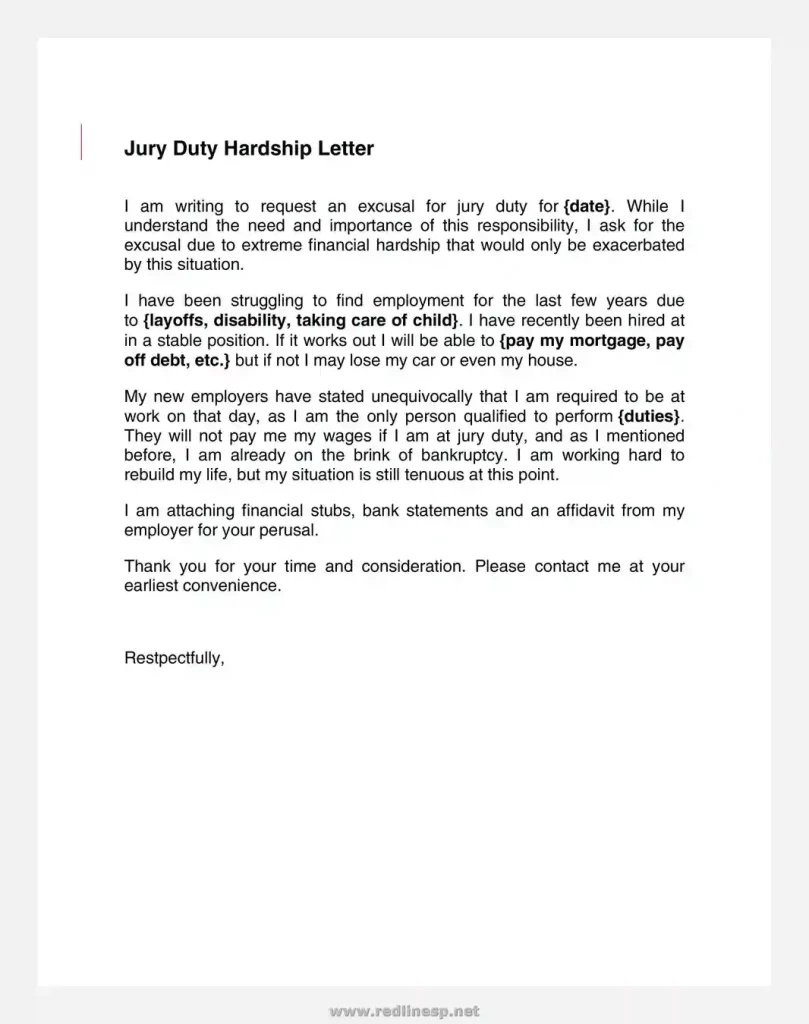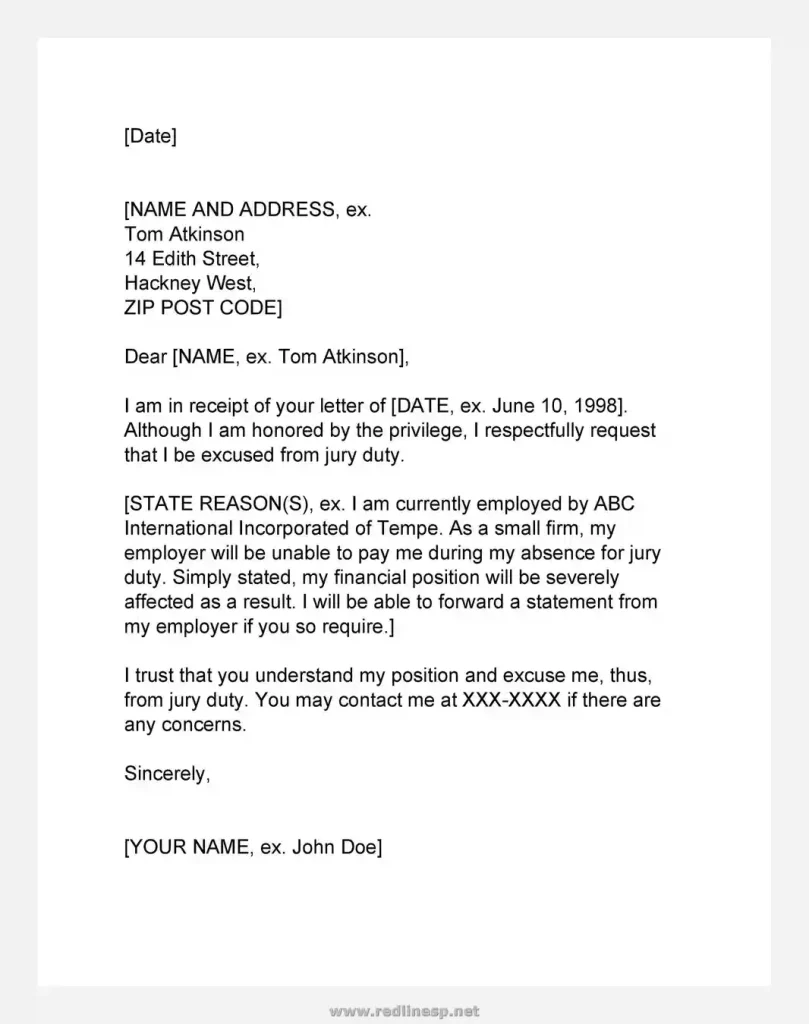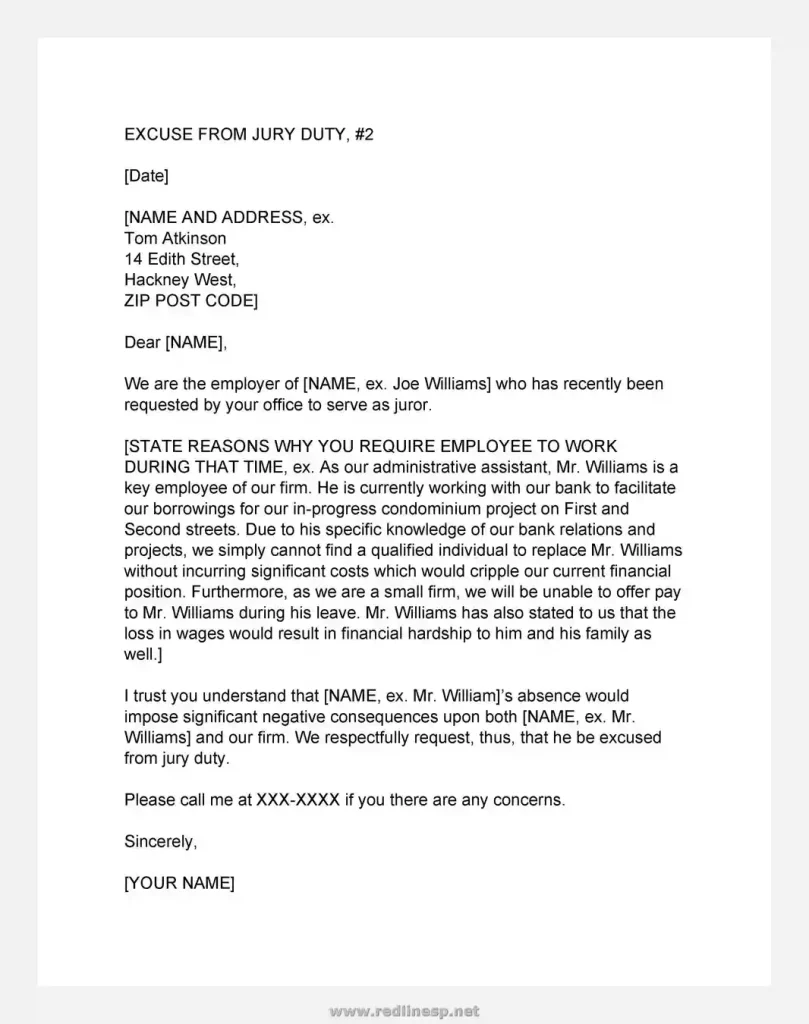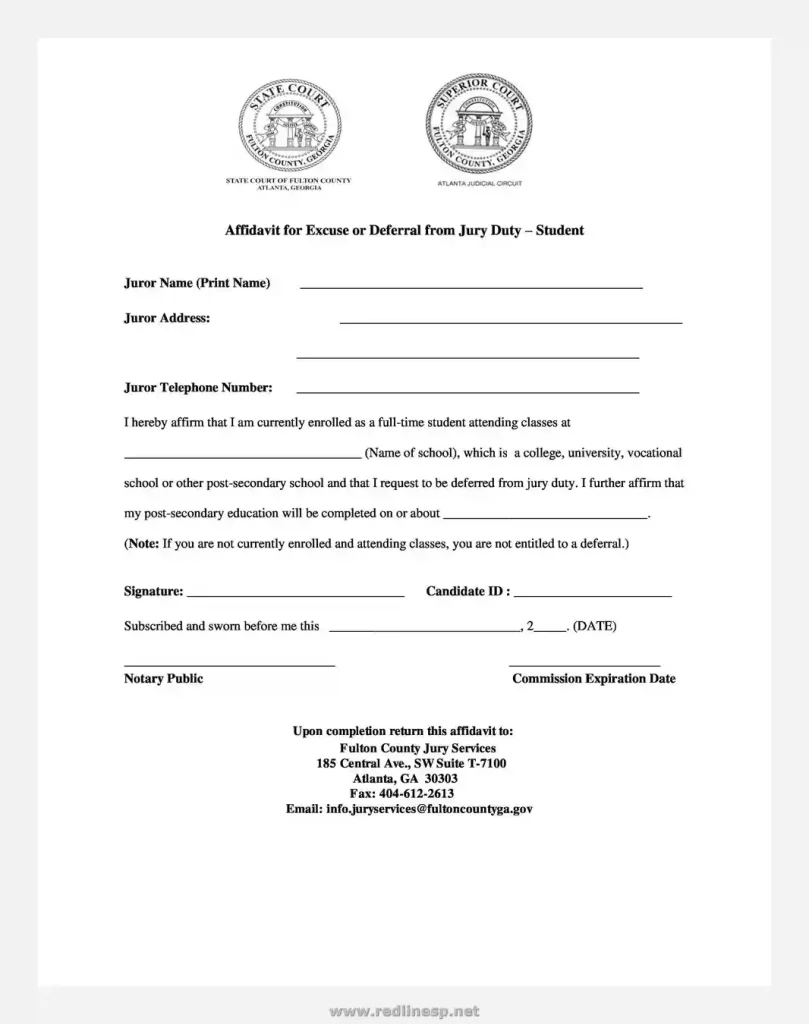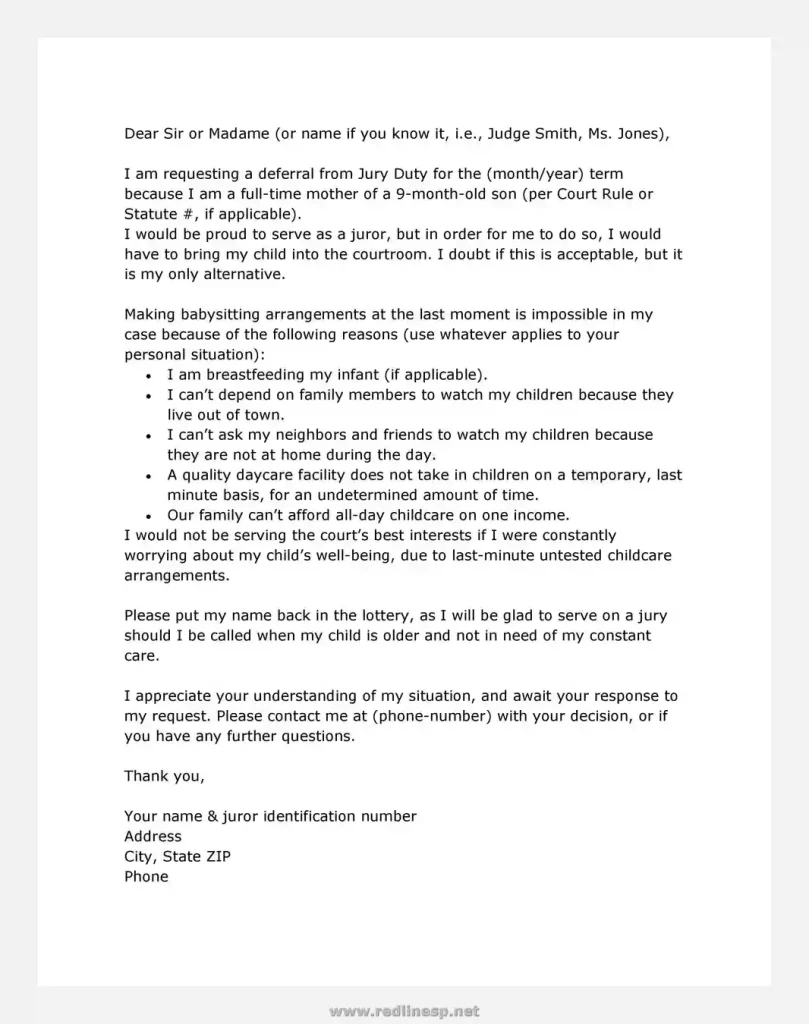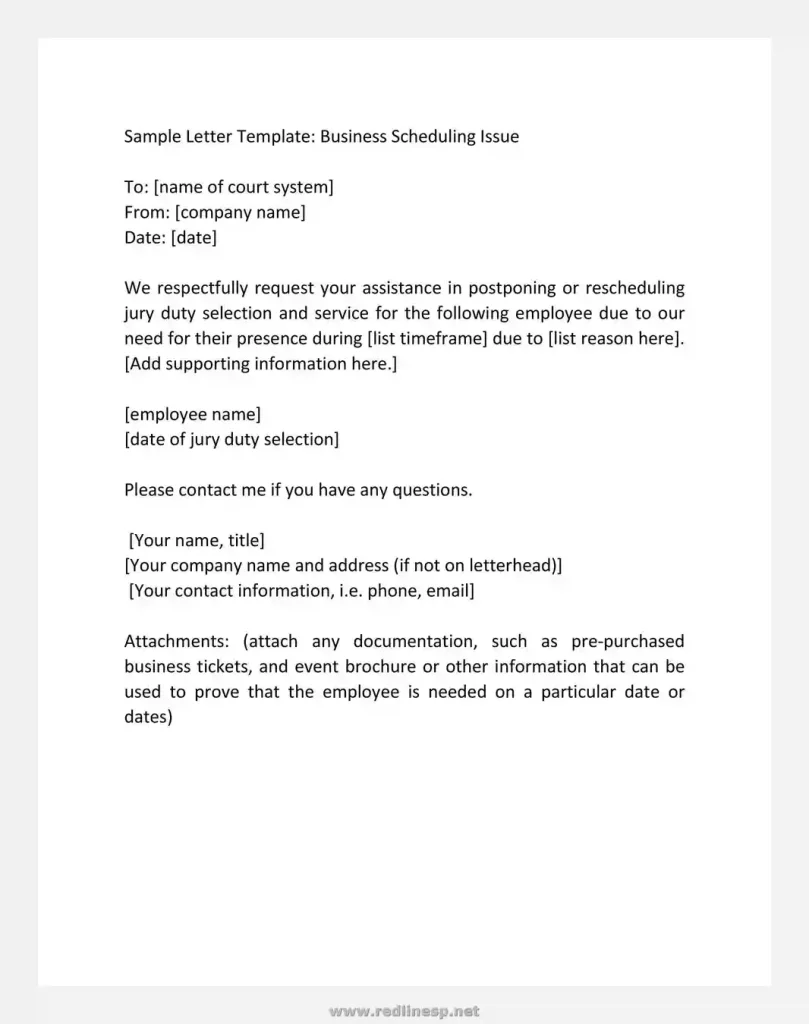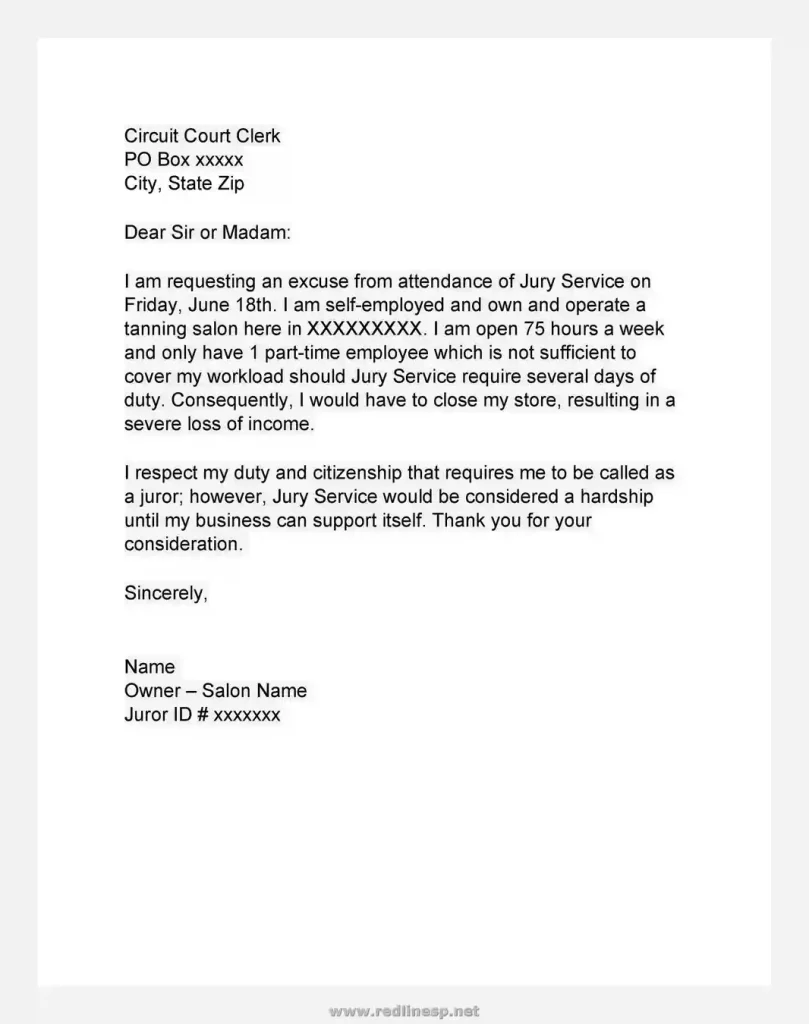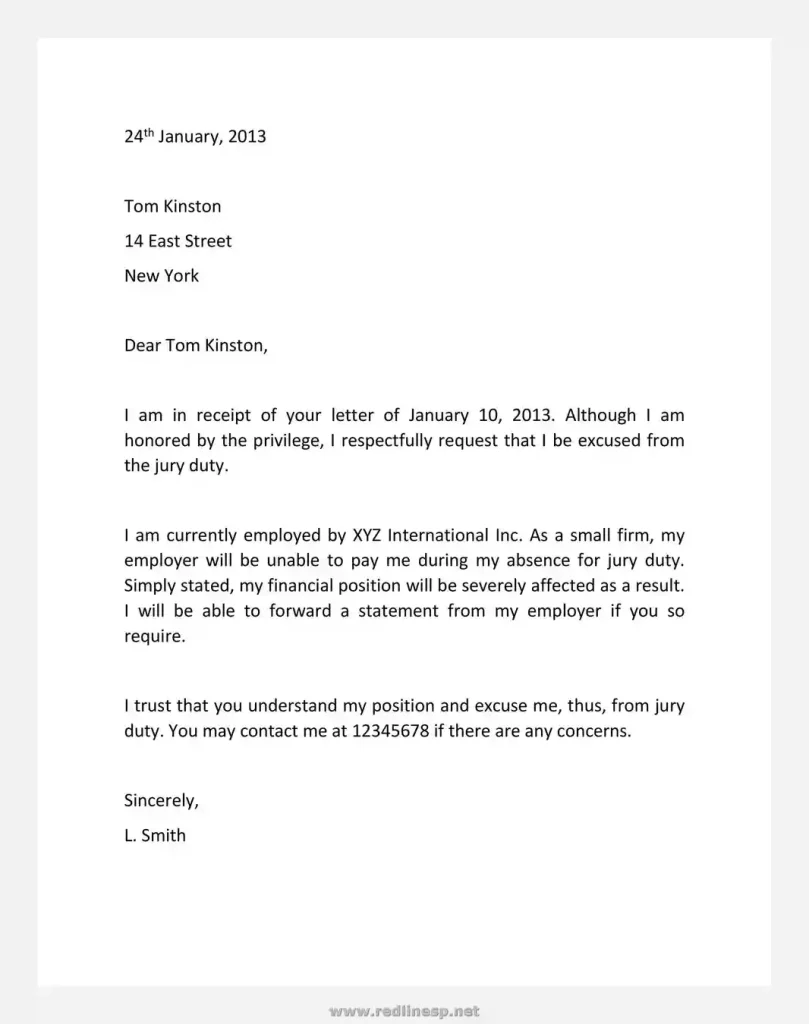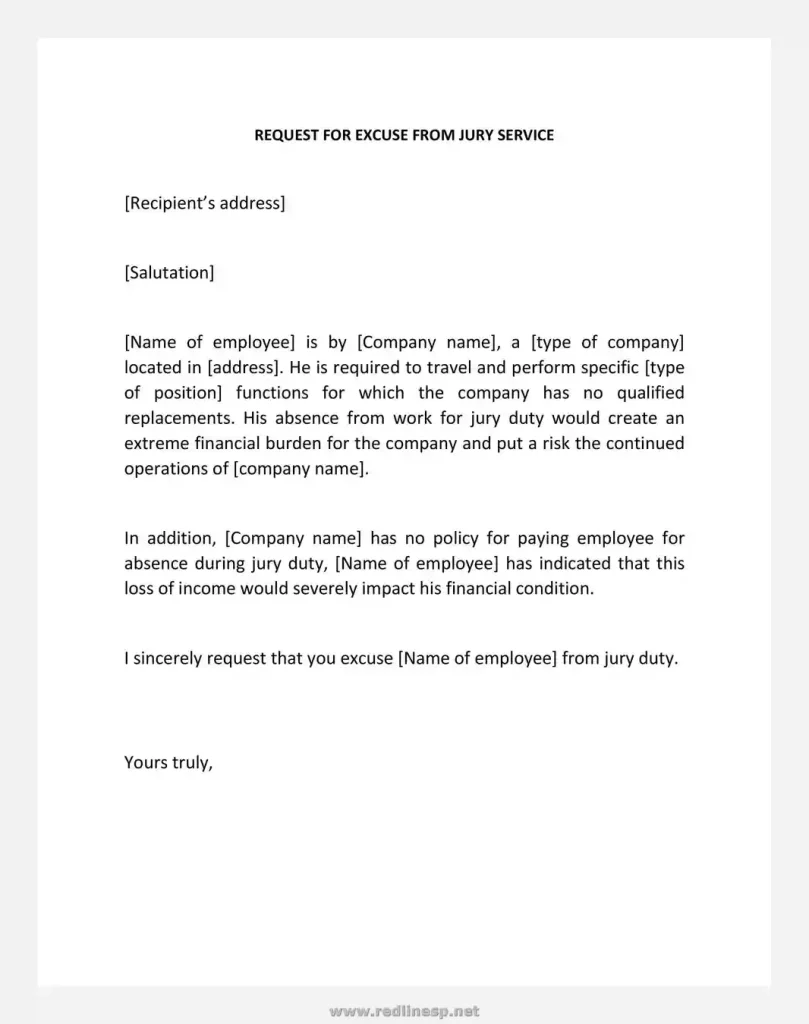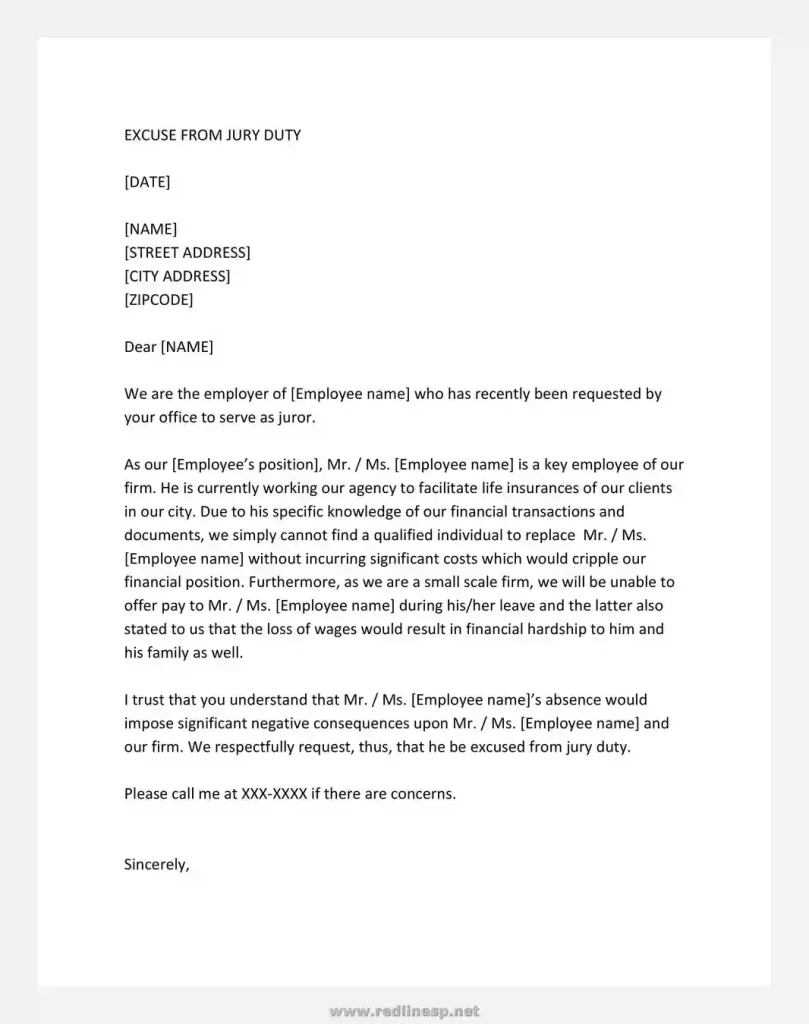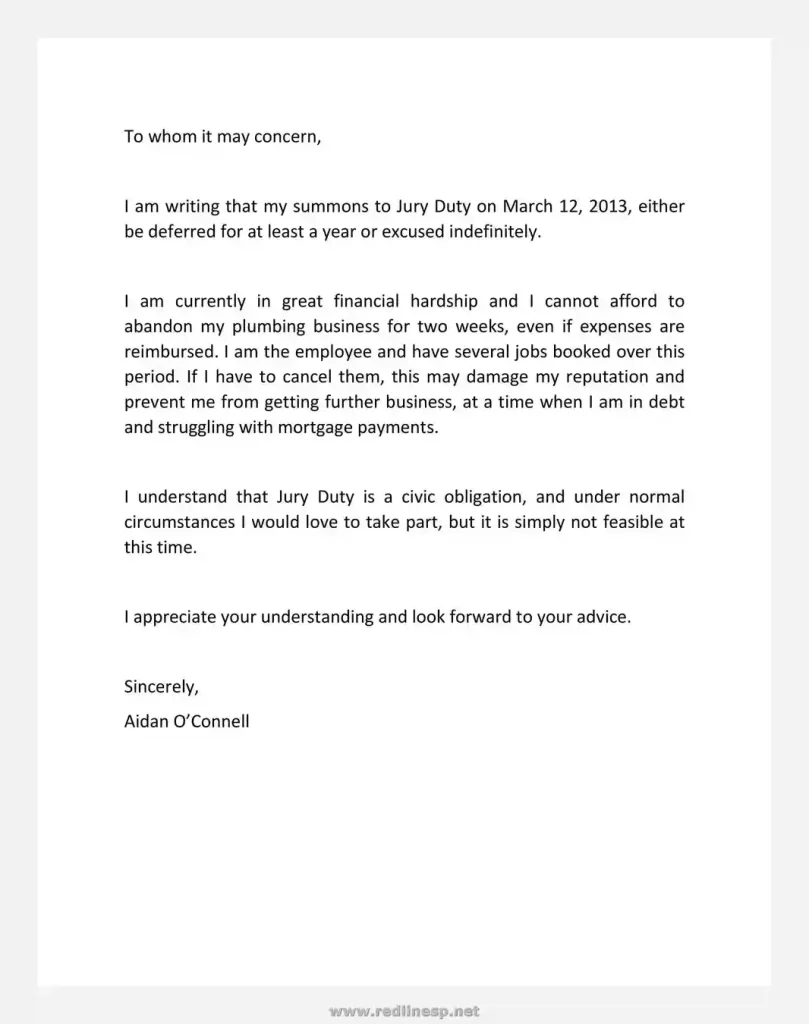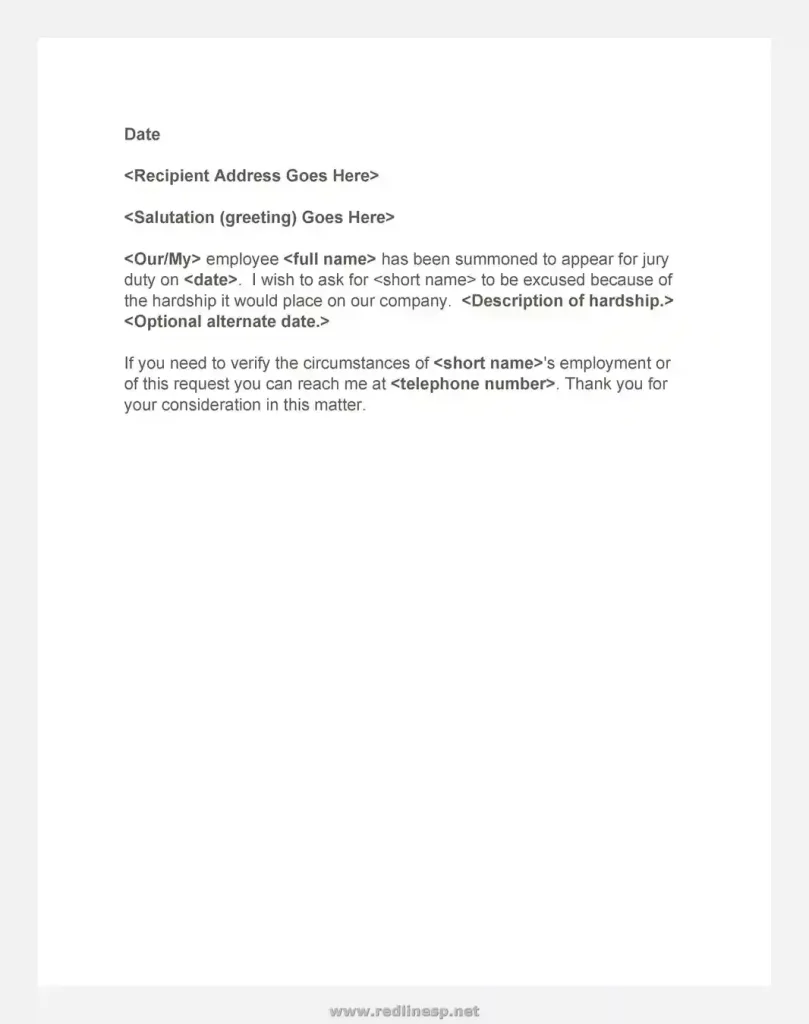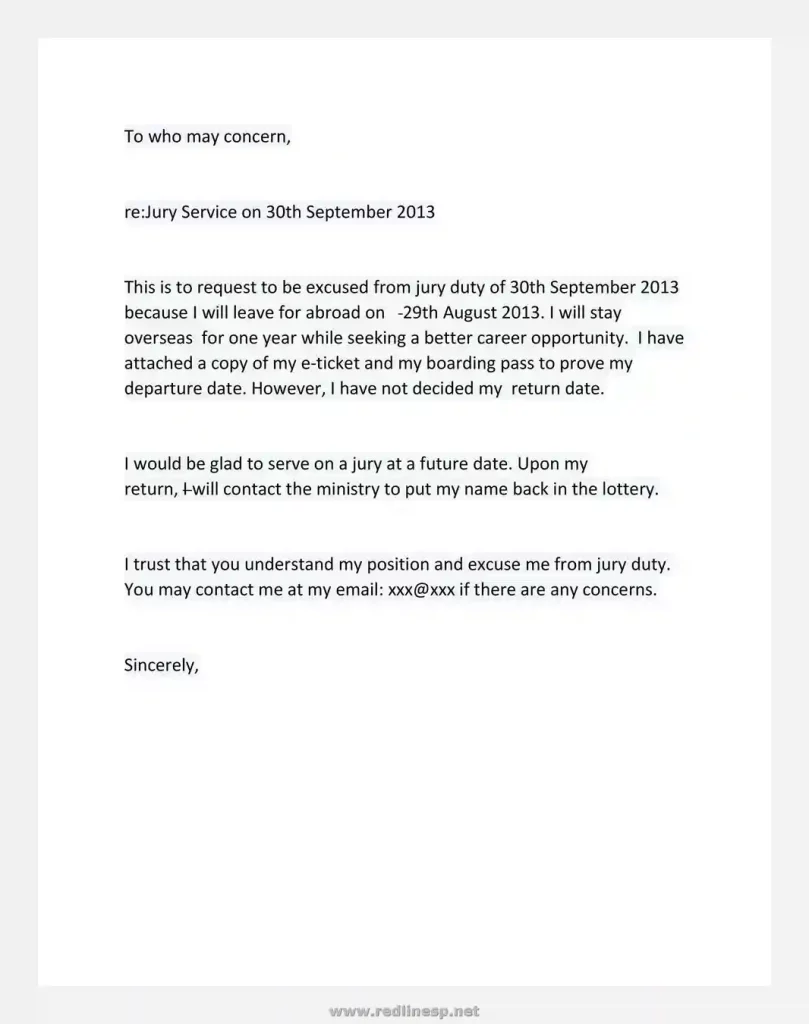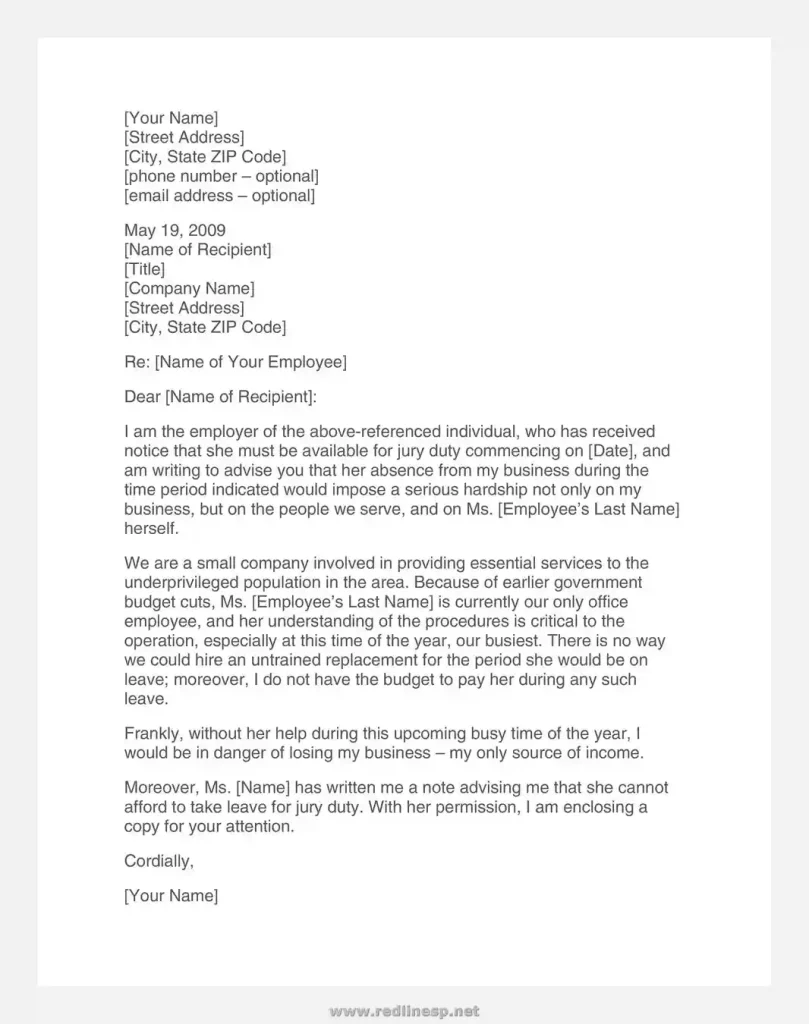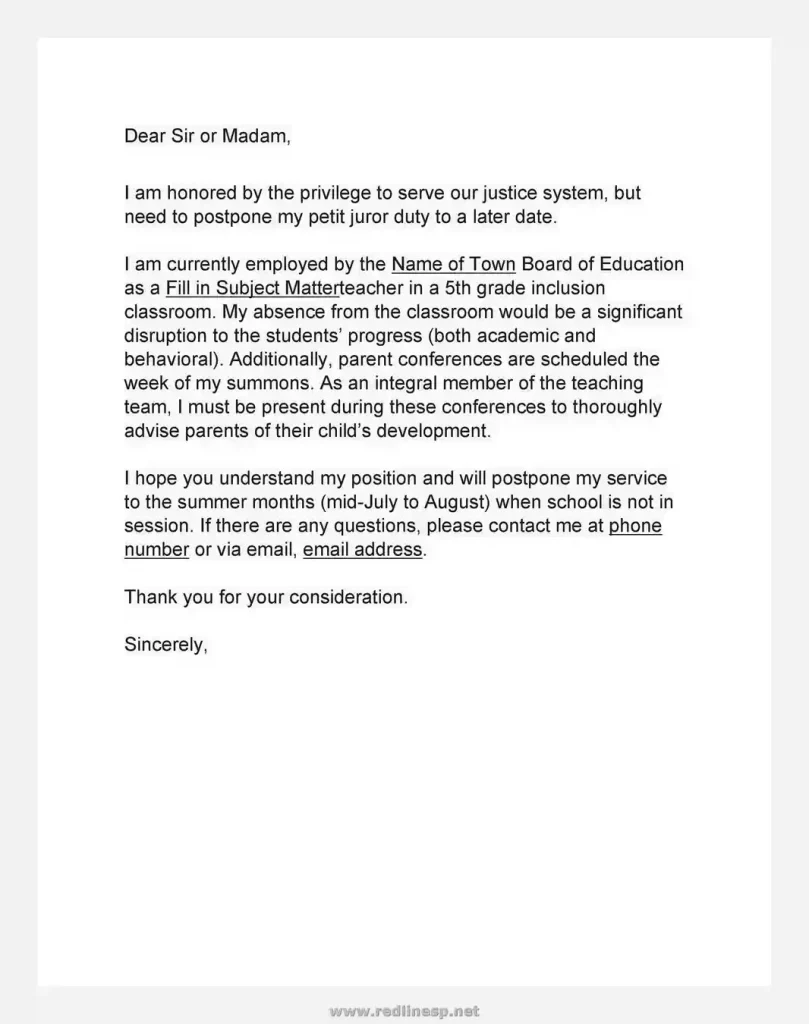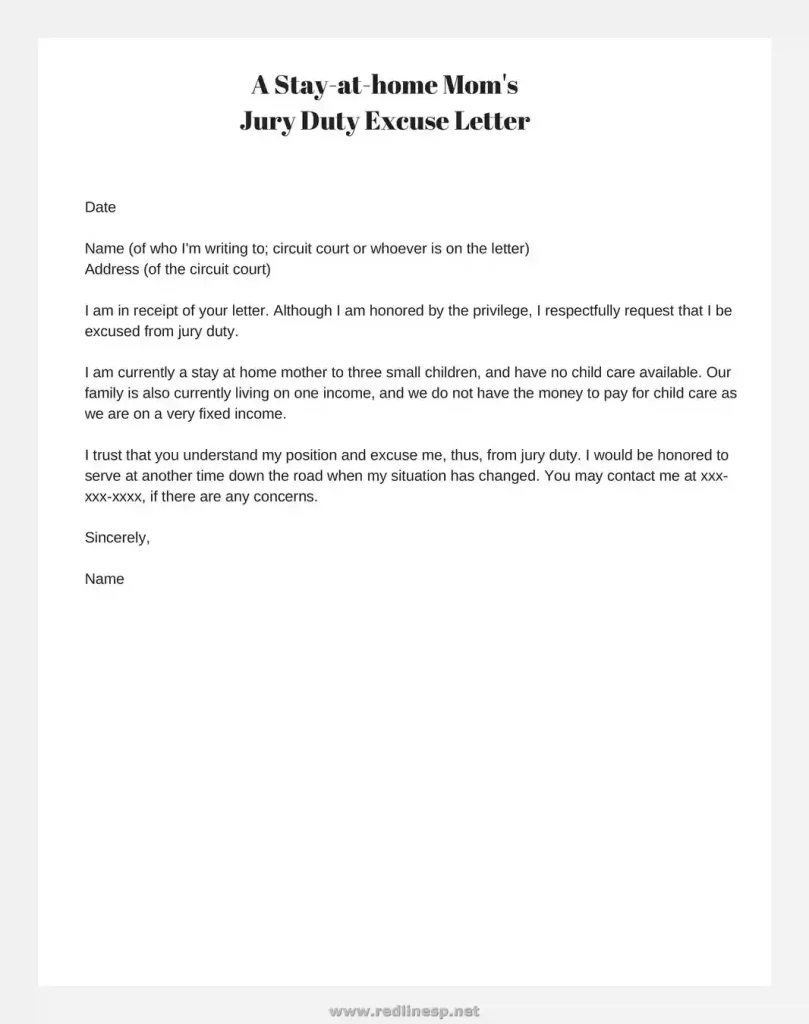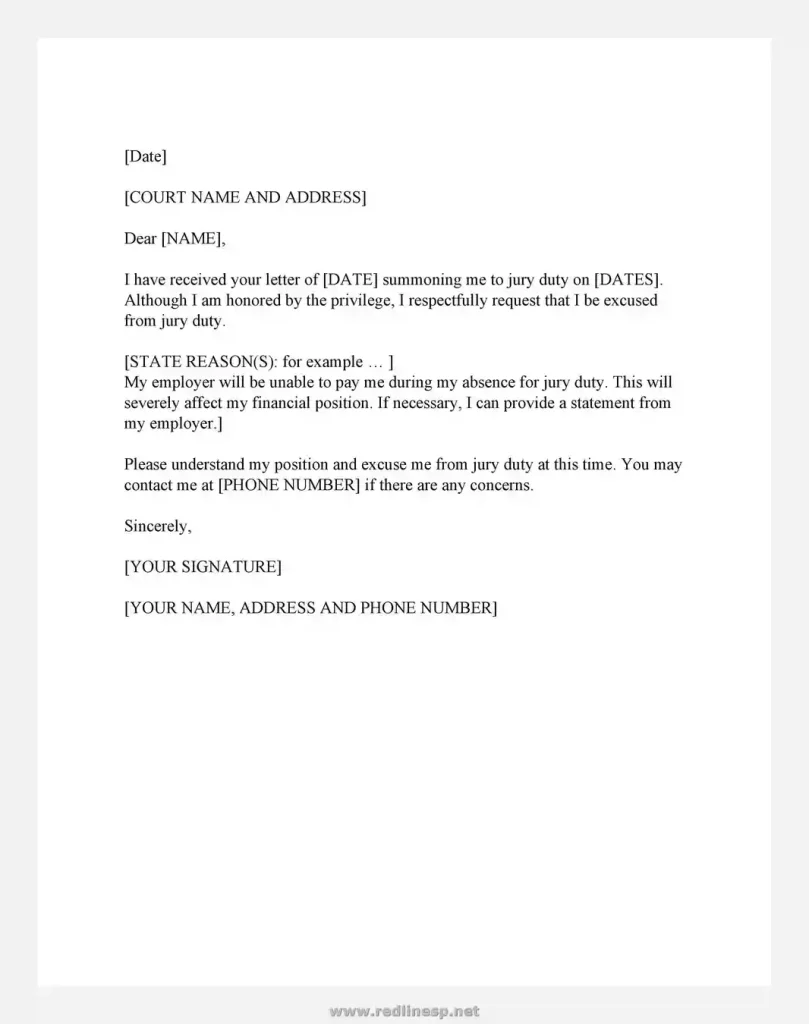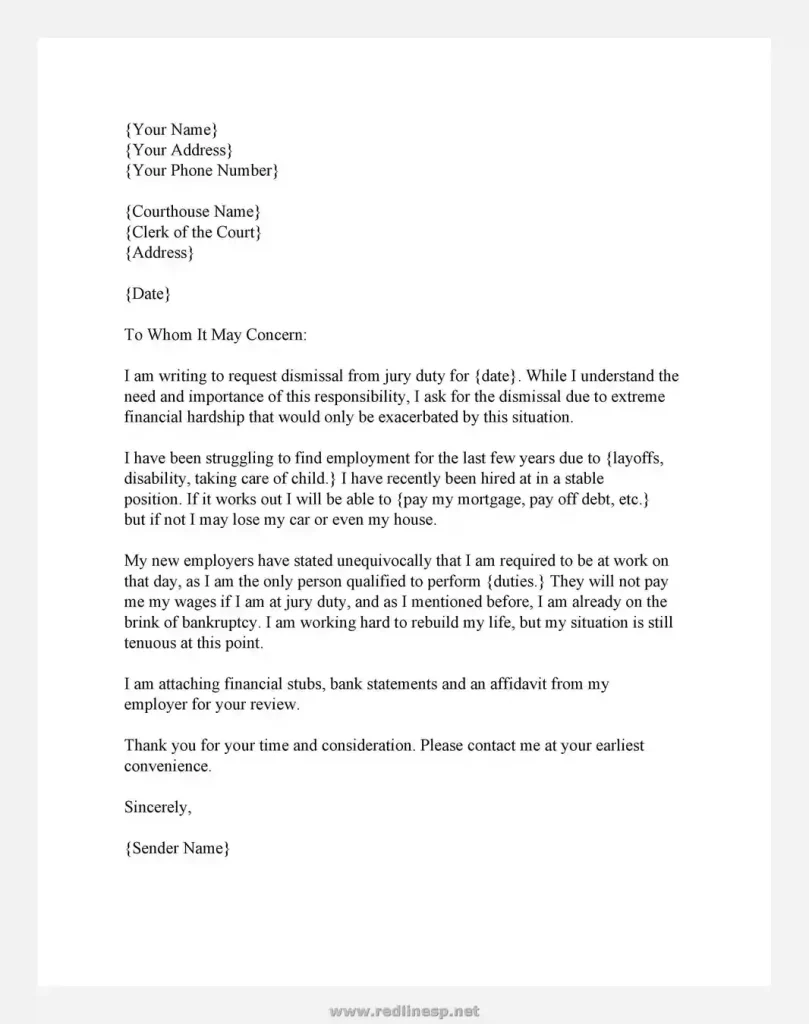Jury duty is an important part of our legal system. It helps ensure fair trials. But sometimes, people can’t serve on a jury. This is when a sample jury duty excuse letter can help. This letter explains why you can’t attend jury duty. Knowing how to write one correctly can save you from legal trouble and help the court understand your situation.
What is a Jury Duty Excuse Letter?
A jury duty excuse letter is a letter you write to explain why you can’t serve on a jury. It tells the court your reasons and asks to be excused. Writing a good letter is important to avoid legal trouble. It acts as a jury duty exemption request.
Who Can Write a Jury Duty Excuse Letter?
Anyone who has a valid reason can write a jury duty excuse letter. Here are some people who can help:
- You: You can write the letter yourself with a good reason. Explain why you cannot attend jury duty.
- Doctors: If you are sick or have a medical problem, your doctor can write a letter for you. The doctor will explain your health condition and why you cannot attend jury duty. This is called a medical excuse.
- Employers: If you have to work and cannot miss your job, your boss can write a letter. The letter will explain why your job is important and why you cannot take time off for jury duty. This is called a work conflict.
- Family Members: Sometimes, a family member can write a letter if you have personal problems or responsibilities. For example, if you care for a child or an older adult, your family member can explain this in the letter. This is related to caregiver responsibilities.
It is important to make sure the letter is clear and honest. The court needs to understand why you cannot attend jury duty.
Sample Jury Duty Excuse Letter
Sample Jury Duty Excuse Letter
Valid Reasons for Jury Duty Excuses
There are several valid reasons to be excused from jury duty:
- Medical Reasons: If you are sick or have a medical condition, you might be unable to serve. A doctor’s note can help explain your situation. This is known as a medical excuse.
- Work-Related Conflicts: Sometimes, your job might make it hard to serve on a jury. Your employer can write a letter explaining this, which creates a work conflict.
- Personal Hardships: You can be excused if you have personal problems like financial issues or family emergencies. Explain your situation clearly. This is often referred to as a hardship letter.
- Caregiving Responsibilities: If you care for someone who needs you, like a child or older adult, you can ask to be excused. Explain who you care for and why you can’t leave them.
Formatting a Jury Duty Excuse Letter
Following a standard format is important when you write a jury duty excuse letter. This helps the court understand your request. Here are the steps to format your letter:
Standard Format Guidelines:
- Your Information: Write your name, address, phone number, and email at the top of the letter. This will help the court contact you if necessary.
- Date: Write the date you are sending the letter. This shows when you made the request.
- Court’s Information: Next, write the court’s name and address. This helps the letter reach its intended destination.
- Salutation: Start the letter with “Dear Sir/Madam” or “To Whom It May Concern.” This is a polite way to address the court.
- Body of the Letter: Explain why you must be excused from jury duty. Be clear and honest. Include important details like medical conditions, work conflicts, or personal hardships.
- Supporting Documents: If you have any papers that support your excuse, mention them in the letter and attach them. This could be a doctor’s note or a letter from your employer.
- Closing: End the letter with a polite closing like “Sincerely” or “Thank you.” Sign your name below the closing.
Importance of Clarity and Conciseness:
When you write your letter, be clear and concise. This means using simple words and short sentences. The court needs to understand your reason quickly. Avoid long explanations. Stick to the important facts. This makes it easier for the court to read and decide on your request.
Information to Include in the Letter
Make sure your letter has all the needed information:
- Personal Details: Include your name, address, and contact information.
- Jury Summons Details: Mention the date you were called for jury duty.
- Reason for the Excuse: Explain why you can’t attend.
- Supporting Documentation: Attach any documents that support your excuse, like a doctor’s note.
Jury Duty Excuse Letter Template
Jury Duty Excuse Letter Template
How Long Should a Jury Duty Excuse Letter Be?
A jury duty excuse letter should be short and to the point. It does not need to be long. Here’s a guide on how long it should be:
- Keep It to One Page: Try to fit your letter on one page. This is usually enough space to explain your reason without adding extra details.
- Include Only Important Information: Focus on the key points. Write why you need to be excused and include any supporting documents. You can tell a short story.
- Use Short Sentences: Write short and simple sentences. This makes your letter easier to read and understand.
- Be Direct: Start with your main reason for being excused. Don’t add unnecessary information. The court wants to know your reason quickly.
By keeping your letter short and direct, you help the court understand your request, which increases the chance of your excuse being accepted.
Submission Guidelines
To make sure your jury duty excuse letter is accepted, follow these steps:
- Write the Letter Early: When you get your jury summons, write your excuse letter. Take your time.
- Use the Correct Format: Make sure your letter has all the important information:
- Your name, address, and contact information
- The date you received your jury summons
- The reason you cannot attend jury duty
- Any documents that support your excuse, like a doctor’s note
- Send the Letter to the Right Place: Check the instructions on your jury summons. It will tell you where to send your letter. You can usually mail or email or deliver it in person. Make sure to follow the court’s preferred method.
- Keep a Copy: Keep a copy of the letter and supporting documents. If the court needs more information, you have everything ready.
- Follow-Up: After you send your letter, you should follow up with the court. Call or check online to make sure your letter was received and processed.
Employer and Doctor’s Role in Writing the Letter
Employers and doctors can help you with your jury duty excuse letter. Here is how they can assist you:
Employers:
- Write a Letter: Your boss can write a letter explaining why you cannot miss work. This letter should explain why your job is important and why you must be at work during jury duty.
- Explain the Work Conflict: The letter should clearly explain your job and why you are needed at work. For example, if you have a special project or are the only person who can do certain tasks, this should be included in the letter.
- Include Contact Information: Your employer should add their contact information if the court needs more details. This helps the court understand and verify the reason you cannot attend jury duty.
Doctors:
- Write a Medical Note: If you are sick or have a medical condition, your doctor can write a note for you. This note should explain your health issue and why it is hard for you to go to jury duty.
- Explain the Medical Excuse: The doctor’s note should clearly state your medical condition and how it affects you. For example, this should be included if you need to rest or have regular treatments.
- Include Medical Details: Your doctor should provide enough details so the court can understand your situation. They should also include their contact information if the court needs to verify it.
Your employer and doctor play a big role in helping you get excused from jury duty. Their letters give important information that supports your excuse request.
What to Do If Your Excuse Letter is Denied
If your jury duty excuse letter is denied, do not worry. Here are some steps you can take:
- Understand the Denial: The court will explain why your letter was denied. Read their response carefully to understand the reason.
- Contact the Court: If you have questions, call the court. They can explain why your excuse was not accepted and what you can do next. What if I Get Called for Jury Duty and Can’t Serve?
- Provide More Information: Sometimes, the court needs more details. You should send more documents or explain your situation better. Write another letter or ask your doctor or employer to help if you have new information.
- Request a Postponement: If you cannot be excused, ask if you can postpone your jury duty. This means you can serve later when it is easier for you.
- Prepare to Serve: Plan to go if the court still needs you to attend jury duty. Talk to your employer about missing work and make arrangements for your responsibilities at home.
- Follow the Law: It is important to follow the court’s instructions. Not going to jury duty without permission can lead to legal trouble.
How to Get Out of Jury Duty?
Sometimes, you may need to get out of jury duty. Here are some steps to follow:
- Check Your Eligibility: First, see if you can be excused. Some people, like those who are sick, very old, or have certain jobs, might not have to serve.
- Write a Jury Duty Excuse Letter: If you have a good reason, write a letter to the court. Explain why you can’t attend jury duty. Make sure to include all important information.
- Include Supporting Documents: Attach any documents that support your excuse. This could be a doctor’s note if you are sick or a letter from your boss if you have work conflicts.
- Send Your Letter Early: Don’t wait until the last minute. Send your letter as soon as you get your jury summons. This gives the court time to review your request.
- Follow-up: After sending your letter, call the court to make sure they received it and ask if they need any more information.
- Request a Postponement: If you can’t be excused, you can ask to postpone your jury duty. This means you will serve later when it is easier for you.
- Attend If Required: If the court says you must attend, make sure you go. Not showing up can lead to legal trouble.
Duty Excuse Letter Example
Here are some examples of excuse letters:
Medical Reason:
[Your Name]
[Your Address]
[City, State, ZIP Code]
[Date]
[Recipient Name]
[Recipient Title]
[Court’s Address]
[City, State, ZIP Code]
Dear Sir/Madam,
I am writing to request an excuse from jury duty. I have a medical condition that makes it difficult for me to serve. Please find attached a note from my doctor explaining my situation.
Thank you for your understanding.
Sincerely,
[Your Name]
Work-Related Reason:
[Your Name]
[Your Address]
[City, State, ZIP Code]
[Date]
[Recipient Name]
[Recipient Title]
[Court’s Address]
[City, State, ZIP Code]
Dear Sir/Madam,
I am writing to request an excuse from jury duty due to work-related reasons. My job requires me to be available during the jury duty period, and my employer has provided a letter explaining this.
Thank you for considering my request.
Sincerely,
[Your Name]
Tips for Writing a Jury Duty Excuse Letter
Here are some helpful tips for writing a jury duty excuse letter:
- Be Honest: Always tell the truth in your letter. Explain your reason clearly and honestly.
- Be Clear and Concise: Use simple words and short sentences. Make your point quickly. The court should understand your reason right away.
- Follow the Format: Use a standard letter format. Include your name, date, court’s address, and a polite greeting.
- Include Important Details: Explain why you can’t serve on the jury. Include details like your medical condition, work conflict, or personal hardship.
- Attach Supporting Documents: If you have any papers that support your excuse, mention them in the letter and attach them. This could be a doctor’s note or a letter from your employer.
- Be Polite: Use polite language. End your letter with a polite closing like “Sincerely” or “Thank you.”
- Keep It Short: Your letter should be one page or less. Only include the most important information.
- Proofread Your Letter: Check your letter for mistakes and ensure it is easy to read and understand.
Following these tips, you can write a strong jury duty excuse letter. This helps the court understand your situation and consider your request.
Writing a sample jury duty excuse letter can help you avoid problems. Make sure to explain your situation clearly and provide any needed documents. This way, the court can understand why you need to be excused. Follow the tips and guidelines to ensure your letter is effective. By doing this, you can help the court make an informed decision about your request.
